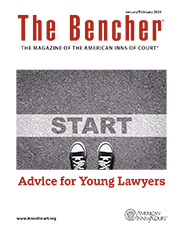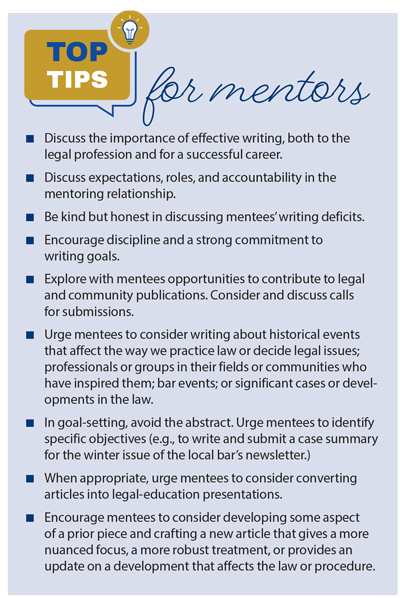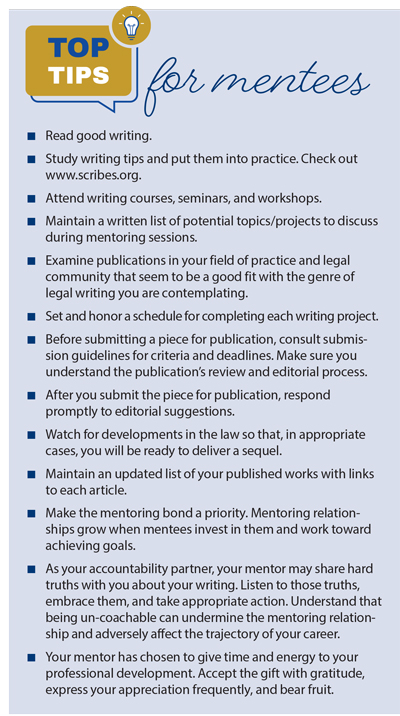Writing-Focused Mentoring
The Bencher—January/February 2024
By Hon. Kem T. Frost and Jillian L. Schumacher, Esquire
 Our impact as members of the bar rests largely in our ability to write effectively. Lawyers and judges should be experts in the written word, capable of clear, succinct, and forceful expression. Yet, many within our ranks lack crucial writing skills. Writing failures often lead to disappointments, disputes, and other unwelcome events that reflect poorly on our profession.
Our impact as members of the bar rests largely in our ability to write effectively. Lawyers and judges should be experts in the written word, capable of clear, succinct, and forceful expression. Yet, many within our ranks lack crucial writing skills. Writing failures often lead to disappointments, disputes, and other unwelcome events that reflect poorly on our profession.
We must do a better job of practicing, modeling, and teaching the art of effective legal writing. Because this ability is so vital to our lives in the law, writing-focused mentoring is essential to equipping those new to the profession for the challenges and opportunities that lay ahead.
Writing-focused mentoring serves dual goals: elevating the mentee’s individual writing skills and inspiring the mentee to use those skills to enrich the profession and the community in ways that go beyond merely serving clients.
Goal One: Elevating Writing Skills
As a first step to elevating a mentee’s writing skills, the mentor and mentee come together to identify the areas that need attention. The task might entail enlisting the help of other professionals in the mentee’s field who can provide input on the mentee’s written work product and identify specific areas for improvement. Using this information, the mentor and mentee set writing goals and chart a course to meet them. Strong mentors expand the horizons of mentees by introducing them to helpful resources, such as effective-writing courses and materials, writing tips and websites, and legal-writing organizations. With these tools, the mentee works independently, investing the time required to develop and practice good writing habits.
To maximize the chances for success, at the outset, prudent mentor-mentee pairs discuss feasibility, expectations, and milestones for reaching writing goals. In making a plan, they set a realistic but not-too-distant timeline for target objectives. As in any strong mentoring relationship, the mentor and mentee sew a healthy measure of accountability into the fabric of the plan. They schedule regular touchpoints to gauge progress. During these sessions they address growth (or lack of it), problem areas, and next steps.
The mentee, of course, must put forth the effort necessary to fulfill the commitment, meet deadlines, and achieve milestones. The mentor’s primary role is to hold the mentee accountable, provide feedback, share insights, and encourage continued work toward the stated goals.
Writing-focused mentors urge mentees to sharpen their skills not only through the writing that comes with a lawyer’s daily work but also by taking advantage of other writing opportunities in the workplace, such as assisting supervisors or peers in preparing articles, writing pieces for the employer’s newsletter, or helping to update, edit, or revise the employer’s publications.
Once mentees become proficient in their ability to write with clarity and precision, writing-focused mentors push them to take their writing talents beyond drafting briefs and contracts for clients to using their newly honed skills to serve the bench and bar as well as the public.
 Goal Two: Using Writing to Serve the Profession and the Public
Goal Two: Using Writing to Serve the Profession and the Public
Mentees can use writing skills to serve the profession by educating fellow members of the bar on developments in the law. Everyday work—the papers on the top of any lawyer’s desk—often holds opportunities for aspiring writers. Emerging issues, trends, and conflicts in the law discovered in daily practice can provide ideal topics for educational articles.
Whenever courts treat the same issue differently, there’s a story to tell. In briefing legal issues, practitioners frequently find courts differ in their approaches and treatment of law points. Taking the time to unpack the differences in a published work is a good way to inform and educate the bench and bar. (And, in the process, the author might help to improve the jurisprudence or lay the groundwork for positive change.)
When lawyers highlight differences in courts’ treatment of an issue, they help push the development of the law. By bringing these issues to the forefront through case summaries or updates in weekly or monthly publications, practitioners help one another stay abreast of changes in the legal landscape. Similarly, when practitioners uncover helpful (and perhaps little-known) resources, they can share their discoveries through book reviews and how-to pieces. By sharing what they know, they serve the profession.
In much the same way, lawyers and judges can serve the general public by educating communities on legal rights and responsibilities. Through articles that raise awareness of legal issues, practitioners help consumers, families, and government and industry leaders understand what the law requires and how they can conform their conduct to meet the law’s demands.
Writing-focused mentors underscore the significance of these fruit-bearing functions, counseling mentees to use their writing know-how to serve the bar and their communities. Mentees who act on this advice often raise their own professional profiles in the process—a valued ancillary benefit that inspires career growth and fulfillment. In this way, mentee-authors can both help educate their colleagues and communities and build appreciation for the legal profession.
 Recognizing Collateral Benefits
Recognizing Collateral Benefits
Writing-focused mentors help mentees see the value not only in contributing to the profession and community but also in using writing opportunities to heighten the mentee’s name recognition in the field, thus enhancing the mentee’s individual profile within the bench and bar. In urging mentees to serve the profession as article writers, effective mentors often share their own win-win experiences and highlight the side benefit of enhancing one’s professional profile along the way.
Minimizing Barriers to Success
As a practical matter, even highly committed professionals struggle to find the time to fulfill these functions. Busy schedules and heavy workloads limit the time mentees can devote to article writing. That’s why the smart ones draw on knowledge acquired in daily practice as inspiration for their articles, penning short pieces that raise awareness of developments, events, or people in the law.
Writing-focused mentors urge mentees to work efficiently by minimizing the time and resources required. They show them how to convert completed legal research, newly acquired expertise, or experiences in the law into pieces that can help other professionals work through the same issues, challenges, or events. For example, mentee-authors could benefit contemporaries by sharing lessons learned through difficult professional experiences, putting insights and take-aways into bar journal articles.
The key is choosing projects that enable mentees to repurpose work and showcase what they know using writing genres that best suit their situations. Writing-focused mentors function as sounding boards, helping mentees choose topics or experiences that they can easily explain to others. A strategic part of the process is selecting projects that are doable given the mentee’s schedule and commitments. Mentees who take on too much or try to cover too broad a topic defeat the goal. Writing-focused mentors counsel mentees to instead plan narrowly tailored pieces so that the projects can be completed in the time budgeted.
Finding Good Fits for Written Works
Writing-focused mentors encourage mentees to explore the large array of legal-writing genres so that mentees will have a good grasp of options and can choose the ones that best suit their preferences and circumstances. Whether highlighting an emerging issue or trend, raising awareness of a problem that needs fixing, crafting a how-to piece, or writing in another genre, the mentee-writer can find a good fit.
Writing-focused mentors play an important role in discussing the various genres with mentees, helping them take the long view, and laying out opportunities on the horizon that might spring from early writing endeavors.
Hon. Kem Thompson Frost retired as chief justice of Texas’s Fourteenth Court of Appeals at year-end 2020, after 22 years on the bench. Jillian L. Schumacher, Esquire, worked as a staff attorney in Frost’s chambers before becoming a board-certified appellate lawyer with Daniels & Tredennick PLLC in Houston, Texas. Frost serves on the boards of the Garland R. Walker American Inn of Court and Scribes—The American Society of Legal Writers. Schumacher is an alumnus of the Garland R. Walker American Inn of Court and a member of Scribes—The American Society of Legal Writers.